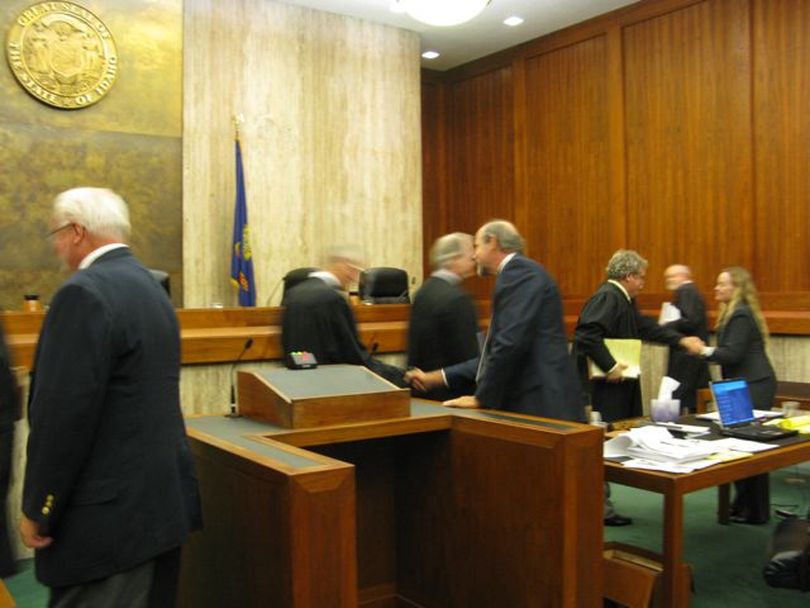Justices have lots of questions in Highway 12 shipments case

Justices of the Idaho Supreme Court had lots of questions for all sides at the hearing this morning on the Highway 12 mega-loads appeal. Here, the justices shake hands with attorneys on both sides - those for the Idaho Transportation Department and ConocoPhillips were seated on the left, and those representing Highway 12 residents and businesses were on the right - at the end of the arguments. After hearing from both sides, the court took the case under advisement.
Among the justices' questions:
Several questioned why ConocoPhillips moved its giant Japan-made coke drums to the Port of Lewiston in May, if no permit had yet been approved to truck them over scenic Highway 12 to Billings. "What gave ConocoPhillips the inkling that they could go ahead and move their stuff to Lewiston?" asked Justice Jim Jones. "I just wonder why they did that when they did not have a permit in hand." ITD's attorney, Larry Allen, responded that it was a "business decision" on the company's part. Jones responded, "Did the department really understand that it could either grant or deny the permit?" "Absolutely, your honor," Allen replied. Erik Stidham, attorney for ConocoPhillips, told the court the company made the decision to move the drums to Lewiston "based on the input given by the experts at ITD" that it could meet the state's permit requirements.
Justice Joel Horton commented, "It feels like we're being asked to decide a lot more than these particular loads." He also asked about liability for personal injury or property damage to residents along the route from the shipments, as opposed to liability for damage to the state, for which the state is requiring a $10,000 bond.
Justice Warren Jones raised questions about whether the district court even had jurisdiction to review the case, and Chief Justice Daniel Eismann joined in that line of questioning.
Eismann told the residents' attorney, Laird Lucas, that he agreed with ITD's argument that its regulation requiring oversize loads to let traffic pass at least every 10 minutes doesn't apply if there's a traffic plan that allows for "frequent passing." Lucas disagreed, saying that interpretation would allow ITD to define "frequent passing" as once an hour, defeating the purpose of the 10-minute rule, which he said sets the "outer boundary." Horton asked Allen, "Why shouldn't we look to the 10-minute rule at that point?" to which Allen responded that situations vary, and some loads might provide for passing without scheduled turnout times. Justice Jim Jones said, "I think the issue of the 10-minute rule and all that stuff is pretty much cut and dried."
Justice Roger Burdick asked ITD how much it costs to rebuild a highway, per mile; Allen said he didn't have that answer.
